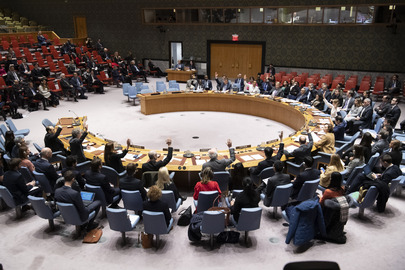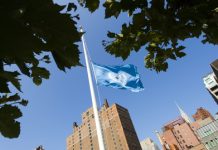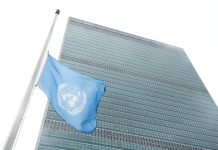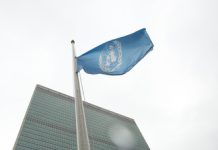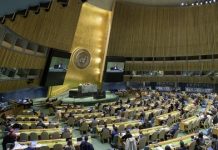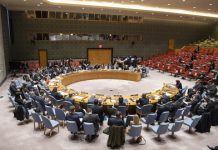Joining us from Port Sudan, Sudan, is Sheldon Yett, UNICEF is Representative to Sudan. Thank you so much for taking the time to speak to us today, sir.
Sheldon Yett: Thank you. Great to be here.
So first I wanted to ask about the escalating fighting across the country, particularly in North Darfur. Can you just give us a little bit of what’s going on on the ground and what the effects on children have been?
Sheldon Yett: Well, this is fighting, of course, that is continuing since the war broke out. This kind of phase of the war broke out, in April last year. The fighting in Darfur is ferocious, intense and affecting children in every corner of the Darfurs, in fact every corner of the country. Since April or so, we’ve had some 150 children at least killed there. Many, many, many injured. And it is just brutal fighting. We’re hearing reports of gender-based violence, rape. We’re seeing schools being hit. We’re seeing health centres being hit. There really isn’t a corner of the Darfurs that is safer for children. This is a crisis for children.
And can you tell us maybe a little bit about the number of casualties? I know that it’s hard to get information, but we wanted to get an idea of how exactly it’s affecting them.
Sheldon Yett: We really don’t know because access is an issue, so I don’t want to give you a figure. We hear reports on a regular basis of schools, of markets, of health centres being hit. Just this weekend, I had reports of some 16 children killed, some 50 people killed, when a market town in North Darfur was hit. And that’s a fairly regular basis, unfortunately. You know, kids didn’t start this war. They are not the ones who are really fighting this war. They’re not responsible for this war, but they are the victims.
I want to come back to that a little later, but I wanted to talk also about infectious diseases which has been a major concern.
Sheldon Yett: Yeah. UNICEF has been working, of course, to ensure that children are safe as it can be in this context from disease. We have a massive cholera outbreak that is expanding by the day. We have thousands and thousands of people who’ve been affected by the disease. We’ve got hundreds who have died. And, of course, we’re making sure communities know how to stay safe. We’re making sure that children know how to stay safe. And we’re making sure as many people can be vaccinated against cholera.
We chartered a plane. We’ve brought in about 1.8 million doses of oral polio, cholera vaccine, a very effective vaccine. We’re working with partners, we’re working with the Ministry of Health, to make sure as many people as possible are vaccinated as quickly as possible. But most importantly, we need to make sure people have access to safe and clean drinking water and good sanitation.
So like you said, because of the conflict it’s tough to get to places. So how are you distributing these vaccines?
Sheldon Yett: You know, it’s very difficult to get to places in Sudan for a variety of reasons. The scale of the country is absolutely massive. You know, it’s bigger than a good chunk of Western Europe. It is a country with poor infrastructure. Even before the war, infrastructure was poor. So rainy season, our roads are often swamplands full of mud. It can take weeks for trucks to get places. Bridges are out. Trucks get stuck on the side of the road, get stuck inside rivers. Bridges are bombed. So that’s an issue. And you need permit, you need permission, to move supplies. You need permission from all warring parties. We need to bring in supplies cross-border from Chad or South Sudan, crossline to get to communities in need. And that can also take weeks. You need to negotiate every inch of the way. We’re working with multiple warring parties. Not an easy task.
I saw on UNICEF’s website that you brought in the first malaria vaccines into the country. Can you tell us why this was the first ever shipment?
Well, of course, the malaria vaccine is relatively new, and we now have a huge risk of malaria in this country, so the vaccines are important, but so are the preventative activities: bed nets and all the other ways of keeping children safe. We know that malaria is one of the largest killers of children in Africa and particularly in Sudan. And we know that the immunity and the vulnerability of children is even greater because children are suffering from other ailments here as well. Their immune systems are weak. Malnutrition is rife around the country. So, all these things put together make children particularly vulnerable. Hence, it’s critical we bring this campaign forward.
That actually brings me to my second question, because I think it was 1 August when famine was declared in Zamzam camp in North Darfur. How is the situation, the food security situation there now? And overall, what’s the outlook for the country?
Sheldon Yett: In the short term it’s not good. We are still having tremendous difficulties getting supplies where they need to go, getting permission to get there. The staff and the supplies, the trucks, the food, the nutrition supplements, the water and sanitation supplies, the health supplies and all the other things that go together. The holistic package for children. Distances are great, access is difficult, and frankly, there are every permanent imaginable is necessary. And it takes weeks of negotiation, often following up at every level of the system to get supplies where they need to go. It is extremely, extremely difficult to do so. There are bureaucratic impediments. There are fighting forces, and we need the permission of authorities to get our supplies and get our staff where they need to go. We think that is crucial. We’re going to provide the support that is required for this famine.
And how are your contacts with the parties? How has that been? I know that you’ve had difficulties in access.
Sheldon Yett: Well, of course, we are in touch with those parties who have control over the fate of children who control access. We need we talk to parties at all levels to ensure supplies can go through. But as you know, it’s one thing for somebody to say something at a very senior level, and it’s something else to see those pledges enacted on the ground, on the battlefield. What really matters is the guy with a gun on the road allowing the truck to go forward. And that’s what we need.
Have you had any incidents where UNICEF staff have been targeted or were they in any direct danger?
Sheldon Yett: Of course, we work with our partners and some of our partners have been today, UNICEF staff themselves have not, but there is always a risk in Sudan. We need to ensure that international humanitarian law is respected by all parties to the conflict. That humanitarians remain safe. That humanitarian aid can be protected and can provide the support they require to those populations in need. That can only happen if all parties to the conflict consistently respect international humanitarian law. And that’s not happening right now.
You know, the needs are big, of course, in Sudan, and it’s very easy to overlook long-term effects on children. What are some of those effects that you’re anticipating as UNICEF, and what are you doing?
Sheldon Yett: Yeah, I mean, let’s go back to the basics here. People are focusing on famine and malnutrition and rightly so. But there are many other components of this crisis. Some 80% of children in this country are not going to school. That is a massive emergency. This is the largest educational emergency that I know of right now. That’s going to ripple through Sudanese society for generations to come. And those children who are not going to school, of course, are far more prone to other issues affecting their welfare, are less likely to get their health support, are less likely to have the protection that they require. We know that ultimately this is a protection crisis. We know that schooling, of course, provides not just the academic education that students expect in the classroom, but provides a protective environment. We need to make sure we can find ways to get children back in school. Many schools are serving as centres for internally displaced people. We need to find other homes for those people so children can use classrooms again. We need to ensure that teachers are back in the classroom, that children have the supplies, that children have psychosocial support. All of these issues are critical.
We need to ensure that children are immunized. I talked a minute ago about the fact that we had cholera and that we had malnutrition. But we also have really low rates of immunization, particularly in those parts of the country where we are seeing conflict. We’re also seeing people, children and their families, moving from one part of the country to another part of the country, often multiple times. And when populations move off course so diseases. So, it’s critical that we get people immunized. We need to find ways to work through the Ministry of Health, through our broad catalogue of partners to make sure every child is immunized. And we have a lot of work to do in that.
I wanted to touch again a little bit on education. And like you said, you know, this is one of, if not the biggest educational crisis in the world. What is being done right now to mitigate in the meantime, by the time the war ends?
Sheldon Yett: There are bright spots. Some states in the country have their own resources and are doing what they can to get children back in school. Here in Port Sudan, I was very pleased to go with the governor and to open schools here. And the state was using its own resources to do so and then really trying to make ends meet. So, there are bright spots. You can see children going to school and that’s fantastic. So that is happening. But we are providing schools outside the formal classroom. We’re providing education, the curriculum on tablets for children so they can continue to learn even if they’re not in a formal classroom. But again, we need people to get children back in school. We’re doing things on the side, but that’s not a substitute for formal education.
Source of original article: United Nations (news.un.org). Photo credit: UN. The content of this article does not necessarily reflect the views or opinion of Global Diaspora News (www.globaldiasporanews.com).
To submit your press release: (https://www.globaldiasporanews.com/pr).
To advertise on Global Diaspora News: (www.globaldiasporanews.com/ads).
Sign up to Global Diaspora News newsletter (https://www.globaldiasporanews.com/newsletter/) to start receiving updates and opportunities directly in your email inbox for free.


